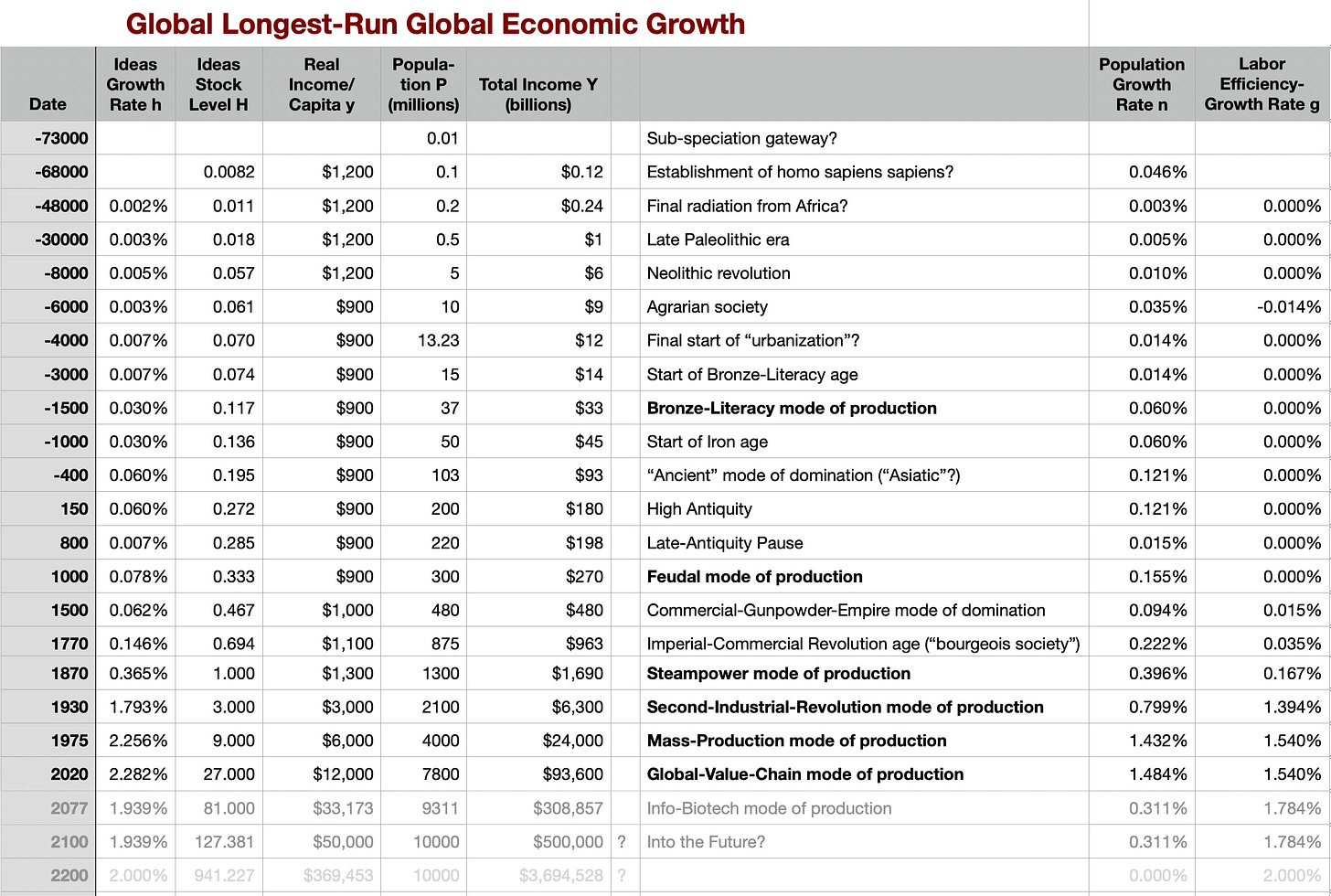LECTURE NOTES: 75,000 Years of Human Population & Average Income, & BRIEFLY NOTED
For 2022-12-16 Fr
CONDITION: Coyotes in Berkeley:
Three on the Upper Strawberry Canyon Trail:
Yes, they were 40 yards away. But they were in no hurry to move off when 140 lbs. of dog and I came around the bend.
LECTURE NOTES: 75,000 Years of Human Population & Average Income:
Trying to pull together the lecture notes for my Economics 135: History of Economic Growth for next semester…
I have my fifteen minute introductory course-launch:
The next question is whether I should then go back and explain how I have constructed the guesses in this table:
of the shape of the human economy over the past 75000 years, or whether I should simply assign my explanation as reading:
It would take perhaps 45 minutes I do not really have to go through the explanation. But it is important. And too often assigned readings are simply… not read.
Other First-Day Readings:
Doug Jones (2022): Toba, or the Sperm Whale Effect?…
Jared Diamond (1987): The Worst Mistake in the History of the Human Race…
Greg Clark (2005): The Condition of the Working Class in England, 1209-2004…
Doug Jones (2022): The Patriarchal Age…
Monika Karmin & al. (2015): A Recent Bottleneck of Y-Chromosome Diversity Coincides with a Global Change in Culture…
MUST-READ: Mechanical Turk!:
Laura Preston: Becoming a chatbot: my life as a real estate AI’s human backup: ‘For one weird year, I was the human who stepped in to make sure a property chatbot didn’t blow its cover – I was a person pretending to be a computer pretending to be a person…
ONE VIDEO: Intel, AMD, Google, TSMC, Apple, Qualcomm?:
ONE IMAGE: Old World Population in þe Bronze & Iron Ages:
Oþer Things Þt Went Whizzing by…
Very Briefly Noted:
Mohamed El-Erian: Next year’s unpleasant choices confronting the Fed: ‘Central bank might stick officially to 2% inflation target but, in practice, pursue a higher one…
Aeem Azhar: The lost pony: ‘Here we are, 14 years into the crypto era. There is one proven use case: financial speculation. This doesn't have to be its destiny…. Vitalik Buterin… posted his reflections…. His truly standout track record speaks for itself…. But I was underwhelmed by his honest analysis…
The Last Bear Standing: Barbarian at the Gate: The Twitter Buyout: ‘Valuation, Sources & Uses, Buyout Model, and Sensitivities…
M. R. Rampino & S.H. Ambrose: Volcanic Winter in the Garden of Eden: The Toba Supereruptilnn & the Late Pleistocene Human Population Crash…
Aaron Rupar & Thor Benson: Dan Froomkin on the state of political journalism: ‘Froomkin’s most recent post takes the Times’ Peter Baker to task for soft-pedaling Trump’s recent Mar-a-Lago dinner two antisemites. He writes: “Baker ends by quoting yet another Republican political strategist posing the question of whether Trump is just pretending to adhere to fringe conspiracy theories, or whether he’s actually bought in. That’s a stupid question. My question is: What more will it take for journalistic institutions like the Times to acknowledge that what Trump is saying requires condemnation, not speculation…
¶s:
Dan Davies: The $80tn “hidden debt” and what it really means: ‘Every publication of financial statistics ought to have the same picture on the cover — Goya’s “The Sleep Of Reason Produces Monsters”. It would help to deter the tidy-minded truth seekers who are reliably driven mad by the crazy world of financial accounting…. For a normal person or company, finding out that you’ve got more debt than you thought you had is a horrible thing…. If the global financial system really was running on a macro-scale version of Sam Bankman-Fried’s sloppy spreadsheets, that would be a reason to panic. But the BIS doesn’t claim this…. If we don’t get hung up on the d-word, then the BIS analysis is valuable… describes is the extent to which the global role of the US dollar is dependent on the Fed being willing to act as the lender of last resort to the international market as well as the domestic one. And the fact that this role—and the consequent international liability—has not only grown so fast, but done so in a way that’s heavily underestimated by the statistics, seems like it’s something worth knowing…
Sam Hammond: Before the flood: ‘It doesn’t have to be this way. We can fight AI fire with AI fire and adapt our practices along the way. But there are an awful lot of laws that will need changing. So it’d just help if our leaders understood what’s at stake and seized the first mover advantage. According to Acemoglu and Robinson, liberal democratic institutions exist within a “narrow corridor” between anarchy and authoritarianism. Whenever technology changes the power balance between society and the state, institutions must adapt to keep the two in harmony. That’s where our 70 year old institutions came from in the first place: as an update to 19th century liberalism given the new challenges created by the second industrial revolution. The so-called “fourth industrial revolution” will force institutional change just as sweeping, lest Snow Crashian anarchy or a Chinese-style panopticon become paths of least resistance. Like the Red Queen said to Alice, we need to start running just to keep in place…
Matt Yglesias: Why hasn’t technology disrupted higher education already?: ‘English… “lecture” derives from Medieval Latin’s “lectura”… cognate with words like “lecteur” (French) and “lector” (Spanish) which mean “reader.”... Today, giving a lecture that consisted of simply standing at a podium reading a book would be considered bad practice. But several hundred years ago, books were extremely expensive because hand-copying manuscripts doesn’t scale. What does scale, at least to an extent, is the human voice. So an institution could serve the very useful function of providing a place where students could gather to hear a person read out loud from a book and write down what the lecturer was saying, securing knowledge. An institution like that would need to have a lot of books on hand and a scholar would need ready access to books, so producing scholarship was highly complementary to lecturing…. Thus was born the familiar university bundle that combines libraries, scholarship, teaching, and certification. This is a somewhat rickety pile of in-principle-separate ideas that really does seem vulnerable to technological disruption. On its face, the relevant disruptive technology should have been the printing press, and the disruption should have happened three or four hundred years ago...
Doug Jones: Barbarigenesis and the collapse of complex societies: Rome and after: ‘Barbarigenesis—the formation of “barbarian” societies adjacent to more complex societies—and its consequences…. A richer and potentially more powerful player may lose out to a poorer player, because the opportunity cost of fighting is greater for the former… a wealth-power mismatch…. In a model of historical dynamics, a wealth-power mismatch generates a long-lasting decline in social complexity, sweeping from more to less developed regions, until wealth and power come to be more closely aligned. This article reviews how well this model fits the historical record of late Antiquity and the early Middle Ages…
Don Moynihan: Elon Musk would like to sell you a used conspiracy theory: ‘Musk called Unsworth a “pedo guy” on twitter to his then 20 million followers, repeated the claims after deleting the original tweet, and told a reporter that Unsworth was a “child rapist.” Musk ultimately won a defamation case by claiming his accusation was not meant to be taken literally. But the incident was revealing of Musk…. Musk wanted to insert himself as the hero…. When his actions were mocked, he lashed out…. Angry at the public criticism that followed, he gravitated towards followers and grifters who applauded him, including a conman to whom he paid $50,000…. Musk gravitates towards the applause…. We are starting to see consequences for Twitter itself…










Maybe those are leftover hyenas.
https://www.berkeleyside.org/2014/09/15/berkeleys-captive-colony-of-spotted-hyenas-closes-after-30-years
The really much more important question is whether you explain the “thorn” typography or whether they have enough non-instrumental intellectual curiosity to figure it out on their own. Ye Olde Pedagogic Conundrum.